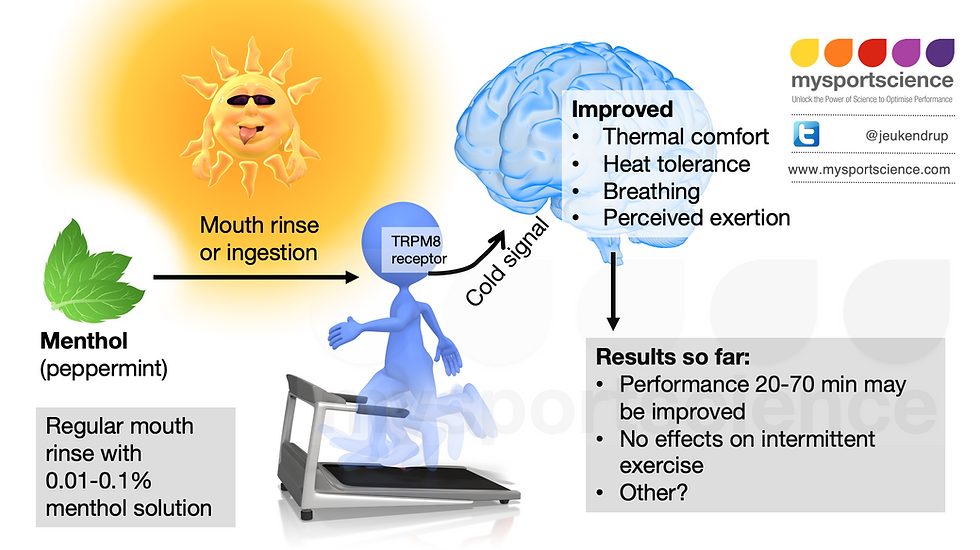Can peppermint improve performance in the heat?
- Asker Jeukendrup
- May 3, 2020
- 3 min read

Cooling effect of menthol
Menthol (peppermint) is known for its familiar perceived cooling effect and fresh sensation in the mouth and nose. The feeling of freshness we experience when we use menthol containing products is in part because of the trigeminal nerve in the brain. This nerve is involved in temperature detection and perception and is also the nerve largely responsible for ice-cream headaches or ‘brain freeze’. Digging deeper, menthol stimulates TRPM8 receptors; a relatively recent discovery, TRMP8 receptors are stimulated by cool-cold temperatures and compounds that mimic this temperature range, such as menthol. An action potential is then generated and the ‘cold signal’ is transmitted to the brain for interpretation. So, menthol acts at a cellular level to mimic cold temperatures and thus produces a cooling sensation.
History of menthol
The idea of menthol use in sport and exercise has been borrowed largely from respiratory medicine. Research into the pharmaceutical effects of menthol began in the late 19th century with a handful of researchers espousing its benefits in the treatment of respiratory conditions associated with tuberculosis. Menthol’s ability to stimulate thermoreceptors was identified as early as 1896. This work was built upon throughout the 20th century by using animal models to assess how menthol affected a host of variables from nasal congestion to ventilation, via digestion, taste and temperature detection.
This was built upon in human models to show that not only could menthol induce feelings of cold in the mouth, but it could also desensitise the mouth to warm sensations, such as capsaicin, the active ingredient in chilli. These effects are often accompanied by a pleasant taste and a peppermint smell, hence why menthol is used in many confectionary and medical products, especially those involved with nasal and respiratory conditions.
Menthol in sport
In sport, we have built upon this knowledge by implementing menthol mouth swilling, and other menthol containing strategies, during exercise in hot environments. This has been most successful in a range of endurance sports lasting 20-70 minutes, with no benefit shown in intermittent protocols that represent team sports to date. The timing of menthol throughout an exercise bout is an interesting area for researchers going forwards; most researchers have employed repeated doses but new evidence suggests that menthol mouth swilling may extend time to exhaustion if applied close to the point of fatigue (2). Concentration of menthol also needs to be considered, with ranges of 0.01-0.1% recommended (1) and allowing for personalisation of a menthol swilling strategies.
Conclusions
Physiologically, menthol may relieve discomfort associated with breathlessness or laboured breathing and as such a compensatory increase in ventilation occurs, with no change in the oxygen cost of exercise reported to date. Athletes also commonly report improved feelings of thermal comfort and or decreases in thermal sensation and ratings of perceived exertion following menthol mouth swilling (3). More simply, athletes feel less hot, or can better tolerate the heat and this may be reflected in how hard they feel exercise is. Taken together this can lead to improved performance as the thermal challenge is perceived as less of a threat to maintaining exercise intensity.
It is still early days for menthol and sports science. There are few studies in the area, but with encouraging findings thus far and many future directions still to be explored, menthol may be a hot topic for a while to come.
References
1. Best, R., Spears, I., Hurst, P. and Berger, N. (2018) ‘The Development of a Menthol Solution for Use during Sport and Exercise’, Beverages, 4(2), pp. 44–10. doi: 10.3390/beverages4020044.
2. Jeffries, O., Goldsmith, M. and Waldron, M. (2018) ‘L-Menthol mouth rinse or ice slurry ingestion during the latter stages of exercise in the heat provide a novel stimulus to enhance performance despite elevation in mean body temperature.’ European Journal of Applied Physiology, 118(11), pp. 2435-2442.doi: 10.1007/s00421-018-3970-4
3. Stevens, C. J. and Best, R. (2017) ‘Menthol: a fresh ergogenic aid for athletic performance’, Sports Medicine, 47(6), pp. 1035-1042. doi: 10.1007/s40279-016-0652-4.













Comments